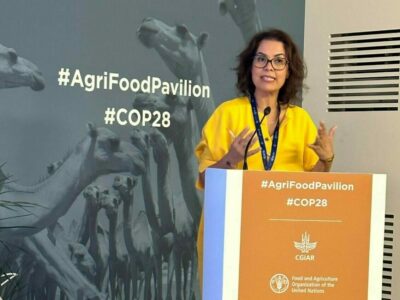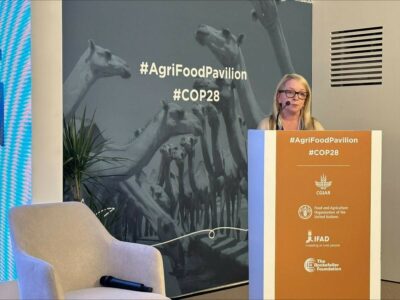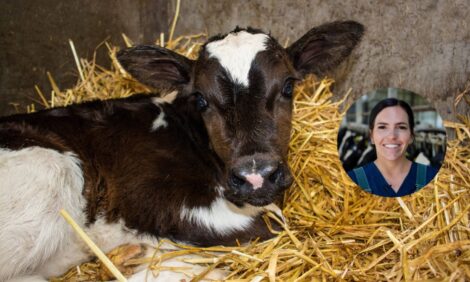



COP28 Panel: Global R&D investments should be part of climate change solution
Panel of experts discussed how stakeholders can accelerate climate and agriculture solutions to improve global food security and nutrition outcomesClimate change is a major contributor to malnutrition and food insecurity around the world, but investments in research, innovation, and local capacity building can help drive solutions, according to a panel of experts who spoke today at COP28 in Dubai.
Global shocks including climate change, conflict, and COVID-19 have increased food and nutrition insecurity, with about 3 billion people now unable to afford a well-balanced, healthy diet that includes whole grains, fruits, vegetables, and animal-sourced foods, according to a new report commissioned by Farm Journal Foundation previewed at COP28. Wednesday’s panel, held at the Food and Agriculture Pavilion at COP28, discussed how the international community, governments, and other important stakeholders can accelerate climate and agriculture solutions to advance global food security and nutrition outcomes.

“With science, we can reduce the carbon footprint of food systems and design them to be sustainable, resilient and equitable, while at the same time enhancing food and nutrition security,” said Dr. Ismahane Elouafi, the Executive Managing Director of CGIAR. “But to unlock the full potential of innovation, the global community must increase its investments in climate and agriculture R&D.”
Speakers at the event included Dr. Elouafi of CGIAR; Dr. Tamara Cofman Wittes, Director of Foreign Assistance at the U.S. Department of State; Afshan Khan, United Nations Assistant Secretary-General and Coordinator of the Scaling Up Nutrition (SUN) Movement; Carmen San Segundo, Director of Environmental, Social, and Governance (ESG) and Sustainability at IBM; Ana Catalina Suarez Peña Senior Director, Strategy and Innovation at the Global FoodBanking Network; Tricia Beal, Chief Executive Officer of Farm Journal Foundation; and Rose Barbuto, Senior Policy Adviser of Farm Journal Foundation. A recording of the event will be available at this link.
Investments in agricultural research and development (R&D), including through institutions like CGIAR and programs like the U.S. whole-of-government Feed the Future initiative, can simultaneously help address climate change, food security, and global nutrition. The U.S. Department of State works closely with the U.S. Agency for International Development and multiple other departments and agencies to implement Feed the Future, the U.S. government’s flagship hunger initiative.
“The United States has long recognized the connection between the climate crisis and the global food crisis. Today, 700 million people are undernourished. Projections show global demand for food over the next 25 years will increase 50 percent. As President Biden has said, if parents cannot feed their children, nothing else matters. We have to act now,” said Tamara Cofman Wittes, Director of Foreign Assistance for the U.S. Department of State. “At COP, the United States announced an additional $100 million for the CGIAR to support R&D and innovation for climate smart food systems and $50 million in support of the Vision for Adapted Crops and Soils (VACS) through the International Fund for Agricultural Development’s (IFAD’s) Rural Resilience Program, pending congressional notification and availability of funds.”
Climate change has imposed significant burdens on global nutrition outcomes, according to Farm Journal Foundation’s report, authored by food and nutrition security experts from Cornell University. The increasing frequency of extreme weather events – including droughts, floods, wildfires, heat waves, and severe storms – has a disproportionate effect on low- and middle-income countries where large proportions of the population rely on agriculture. Extreme weather can lead to crop failures, pressure from diseases and pests, lost crop and livestock productivity, and lower nutritional value of food – ultimately hurting farmers’ livelihoods and leading to higher food costs for consumers.

“Our global food system faces unprecedented pressure from climate change, and unfortunately these challenges disproportionately affect people in lower-income countries who have contributed least to global warming,” said Tricia Beal, CEO of Farm Journal Foundation. “However, solutions to global nutrition and climate challenges don’t have to be at odds. With more investment in agricultural research and innovations, we can help improve the sustainability of our agricultural systems and better ensure access to healthy, nutritious foods for everyone.”
At Wednesday’s event, panelists spoke about the need to elevate global nutrition within broader discussions about policy, including conversations about solutions to climate change. According to Farm Journal Foundation’s report, women, children, and adolescents are particularly vulnerable to food and nutrition insecurity, as they often have higher nutrient needs and generally have lower access to income compared with men.
“A transition to healthy diets and climate-resilient food systems is both achievable and necessary,” said Afshan Khan, Coordinator of the Scaling Up Nutrition (SUN) Movement. “For change to occur, nutrition must be incorporated into every policy, budgetary, financing, and development consideration, much like climate change.”
Increasing support for local capacity and safety-net initiatives such as food banks can help support food and nutrition security, according to Wednesday’s panel. Climate change has imposed significant burdens on low- and middle-income countries in particular. This is because they often have limited capacity to adapt to climate challenges, due to a lack of social safety nets, robust infrastructure, and tools and technologies that would enable farmers to produce good crops even in the face of increasingly difficult conditions.
“Food banks are an essential part of the food system, working in improving supply chain logistics, strengthen communitarian social protection systems, public policy, and advocacy in communities and nationally, to reduce food loss and waste, which avoids emissions and supports the most vulnerable populations” said Ana Catalina Suarez Peña, Senior Director of Strategy and Innovation at The Global FoodBanking Network. “This panel brings together the connection between agriculture, global nutrition, and climate change, which is all the more relevant given that the poorest populations are the most affected by climate change and food access. We seek to support and work with communities based on their cultural diversity and capacities.”
Investments in research and technology will be critical to ensuring that the world can address global nutrition security issues as well as climate change. Ensuring that farmers have access to improved tools and technologies will also be key.
“The climate crisis affects all of us, but not equally,” said Carmen San Segundo, Director of ESG and Sustainability at IBM. “For IBM, empowering communities means that farmers have access to skills and technologies, such as Artificial Intelligence, to face more frequent extreme weather events. We have worked with partners to empower farmers in Africa, the Americas and Asia, giving them the tools to build local resilience.”


